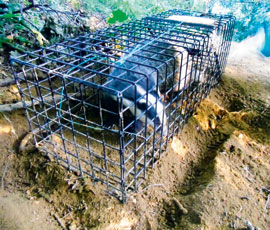Valuable lessons learned from badger cull – NFU

The NFU remains committed to delivering the pilot badger culls, despite marksmen failing to meet their targets.
According to DEFRA, 708 badgers were removed in the six-week cull in west Gloucestershire, which represents 30% of an estimated population of 2,350.
The cull ended on Tuesday (15 October), but Gloscon, the company carrying out the cull in the county, has applied to Natural England for an extension to the culling licence up to 1 December, the closed season for cage-trapping badgers.
Natural England is expected to grant an extension to the licence early next week.
An NFU spokesman said: “We understand the company carrying out the cull in Gloucestershire has applied to Natural England to extend the culling period to ensure continued disease control as part of the pilot badger cull operations.
“We understand from the chief vet that badger culling over a four-year period in both pilot areas will help to reduce TB in cattle.”
He added: “There have been learning experiences as to the best way of carrying out the culls effectively throughout the operations and the knowledge gained will be essential to help with future roll-out of these culls in areas where TB is rife.
“The NFU and the companies carrying out the badger control operations remain committed to reducing the badger population in those areas where TB is endemic to control the spread of this terrible disease.”
DEFRA secretary Owen Paterson told the House of Commons that early indications were the pilot culls had been carried out in a “safe and humane” way.
But he added: “Nevertheless, the Gloucestershire pilot has again demonstrated that the cull period may need to be longer than six weeks in future, enabling teams to adapt their approaches to suit local circumstances.”
The six-week cull in west Somerset, which ended on 6 October, removed 850 badgers – 60% of the population. Marksmen secured a three-week extension to the cull to try to enable them to reach the target of 70%.
In his written statement, Mr Paterson said the experience gained on the ground in the two pilots was “invaluable”.
He paid tribute to the local farmers and landowners undertaking the cull, often in difficult terrain and weather, and in the face of intimidation by a “small minority who are determined to stop this disease-control policy.”
He described the four-year pilots as “another step towards halting the spread of bTB” and a continuation on “good progress on all aspects of our draft strategy to eradicate the disease in England within 25 years”.
But animal rights groups, including the RSPCA and Brian May’s Save Me, claimed the policy is failing and they have repeated calls for the government to stop the cull.
Meanwhile, conservation charity Care for the Wild claimed the pilot culls had so far cost taxpayers £2,200 per dead badger.
The charity said it came to the figure by including the cost of policing the culls – an estimated £1m per zone – Whitehall costs of £500,000, such as materials for the cull including cages, and the £1m spend on last year’s aborted cull.
Glos badger cull goes on despite missing target
